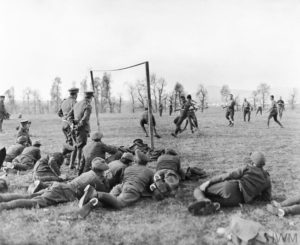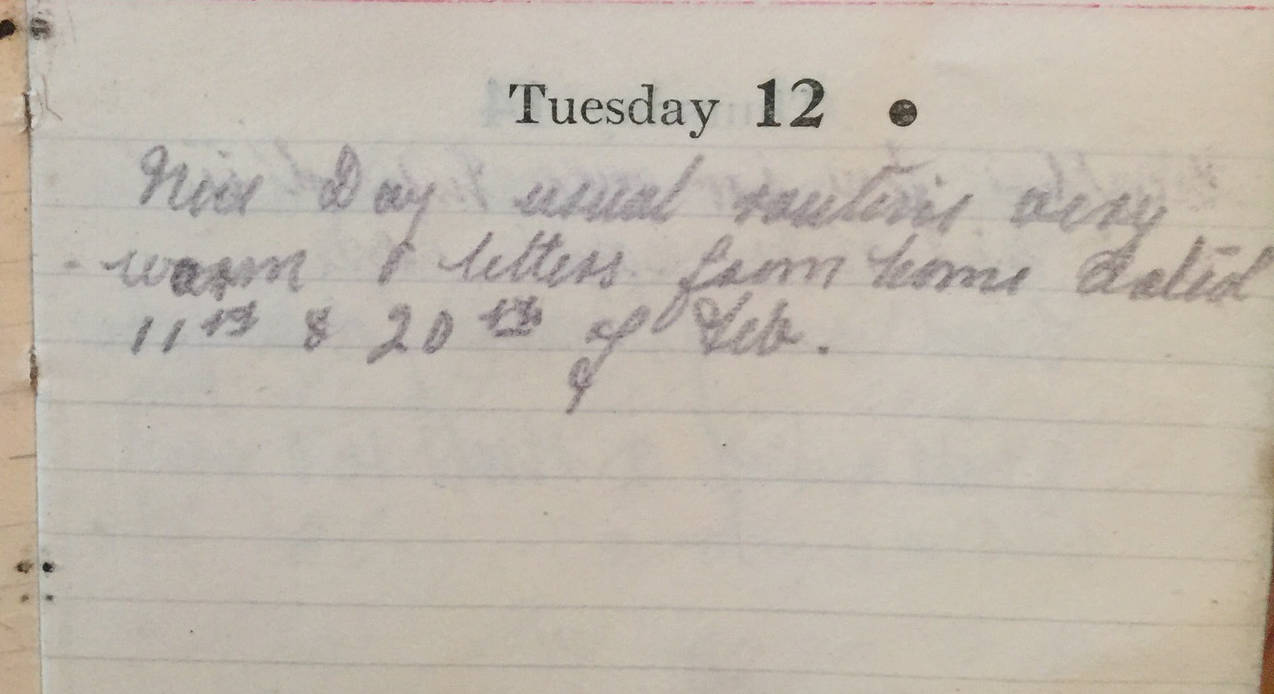Tuesday March 12th, 1918
Nice day, usual rations. Very warm & letters from home dated 11th and 20th February.
Football & WWI

The Inter-Platoon Knock-out Football Competitions starts today. It will be played over the next fortnight and reported often in the Battalion Diary. This shows the increasing importance that the British Army placed upon sports during WWI. In particular, it recognized that football was good for the morale of its ‘civilian’ Army, building team spirit and breaking down barriers. The photograph, a case in point, shows a football match between the Officers and other ranks in Salonika on Christmas Day 1915.*
However, the relationship between WWI and British soccer got off to a rather ignominious start in 1914. Unlike many other sports bodies, the Football Association (FA) decided that the 1914-15 season should continue unabated. As the 5,000 professional footballers were under one-year contracts with their clubs, they also needed the clubs to agree to release them if players wanted to sign up.
Reaction was exacerbated because football was seen as the working man’s game and was incredibly popular. Over 120,000 people had attended the FA Cup Final in 1913. This incited many to comment. Even Sir Arthur Conan-Doyle got in on the act in September 1914, demanding that fit young men should sign up, writing, ‘There was a time for everything, but there is only time for one thing now, and that thing is war‘.¹ Another influential commentator even suggested that no-one should be allowed to attend a football game unless they were over 40 years old.
Footballers as Soldiers

Eventually this pressure, and falling attendance during early 1915, convinced the FA to suspend the 1915-16 season. Over time approximately 2000 professional footballers joined up – many both serving with distinction and ending their careers. William Angus (Glasgow Celtic) and Donald Bell (Bradford City) both received the Victoria Cross, the latter posthumously. Walter Tull (Northampton Town and Tottenham Hotspurs) became the British Army’s first black officer when he was commissioned in May 1917. Tull served with distinction in France and then in Italy where he was mentioned in despatches for his ‘gallantry and coolness’ under fire during the Battle of Piave. He was killed in France in March 1918 while leading an attack on German trenches at Favreuil.
Over 120 professional footballers together with their fans served with the 1st Football (17th) Battalion of the Middlesex Regiment. Their commanding officer, Frank Buckley (professional player, England international and post-war football manager) estimated that, of the 600 original volunteers, over 500 were dead by the mid-1930s as a result of the war.²
The glorious game begins today.
13th (Service) Battalion War Diary – 12th March 1918 – No 1 Sector, Olasli
Training as per programme. Training Programme 18th to 20th March issued (Appendix No 3). Inter-Platoon Knockout Football Competition commenced. 1 OR is struck off effective strength under GRO 1011 with effect from 11-3-18. Medals for events in the Battalion sports are now on view in the Canteen.
References & Further Reading
‘Football and the First World War‘ by Spartacus
² ‘Football in France & the Significance of WWI‘ by Nick Roche in WorldSoccer
* ‘Soccer game in Salonika‘, Q31574 IWM
# ‘Walter Tull‘ in Sparticus


